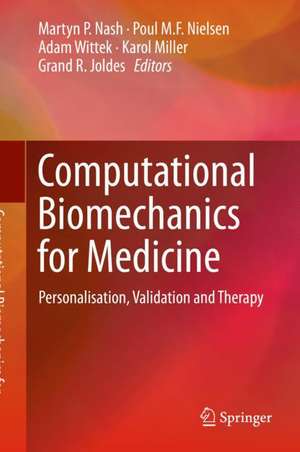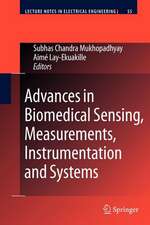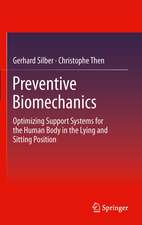Computational Biomechanics for Medicine: Personalisation, Validation and Therapy
Editat de Martyn P. Nash, Poul M. F. Nielsen, Adam Wittek, Karol Miller, Grand R. Joldesen Limba Engleză Hardback – 14 aug 2019
| Toate formatele și edițiile | Preț | Express |
|---|---|---|
| Paperback (1) | 1086.75 lei 6-8 săpt. | |
| Springer International Publishing – 15 aug 2020 | 1086.75 lei 6-8 săpt. | |
| Hardback (1) | 1093.72 lei 6-8 săpt. | |
| Springer International Publishing – 14 aug 2019 | 1093.72 lei 6-8 săpt. |
Preț: 1093.72 lei
Preț vechi: 1151.28 lei
-5% Nou
Puncte Express: 1641
Preț estimativ în valută:
209.29€ • 223.80$ • 174.50£
209.29€ • 223.80$ • 174.50£
Carte tipărită la comandă
Livrare economică 17 aprilie-01 mai
Preluare comenzi: 021 569.72.76
Specificații
ISBN-13: 9783030159221
ISBN-10: 3030159221
Pagini: 156
Ilustrații: VIII, 149 p. 60 illus., 48 illus. in color.
Dimensiuni: 155 x 235 mm
Greutate: 0.4 kg
Ediția:1st ed. 2020
Editura: Springer International Publishing
Colecția Springer
Locul publicării:Cham, Switzerland
ISBN-10: 3030159221
Pagini: 156
Ilustrații: VIII, 149 p. 60 illus., 48 illus. in color.
Dimensiuni: 155 x 235 mm
Greutate: 0.4 kg
Ediția:1st ed. 2020
Editura: Springer International Publishing
Colecția Springer
Locul publicării:Cham, Switzerland
Cuprins
Chapter1. Biomechanical simulation of vaginal childbirth: the colors of the pelvic floor muscles.- Chapter2. Patient-specific modeling of pelvic system from MRI for numerical simulation: validation using a physical model.- Chapter3. Numerical analysis of the risk of pelvis injuries under multidirectional impact load.- Chapter4. Parametric study of lumbar belts in the case of low back pain: effect of patients' specific characteristics.- Chapter5. Quantitative validation of MRI-based motion estimation for brain impact biomechanics.- Chapter6. Meshless method for simulation of needle insertion into soft tissues: preliminary results.- Chapter7. A biomechanical study on the use of curved drilling technique for treatment of osteonecrosis of femoral head.- Chapter8. A hybrid 0D-1D model for cerebral circulation and cerebral arteries.- Chapter9. Removing drift from carotid arterial pulse waveforms: a comparison of motion correction and high-pass filtering. Chapter10. Rapid blood flow computation on digital subtraction angiography: preliminary results. Chapter11. Muscle excitation estimation in biomechanical simulation using NAF reinforcement learning.
Textul de pe ultima copertă
This book contains contributions from computational biomechanics specialists who present and exchange opinions on the opportunities for applying their techniques to computer-integrated medicine, including computer-aided surgery and diagnostic systems. Computational Biomechanics for Medicine collects peer-reviewed chapters from the annual Computational Biomechanics for Medicine Workshop, in conjunction with the Medical Image Computing and Computer Assisted Intervention [MICCAI] Society conference. The works are dedicated to research in the field of methods and applications of computational biomechanics to medical image analysis, image-guided surgery, surgical simulation, surgical intervention planning, disease diagnosis and prognosis, analysis of injury mechanisms, implant and prosthesis design, artificial organ design, and medical robotics. These chapters will appeal to a wide range of researchers and students within the fields of engineering and medicine, as well as those working in computational science.


























